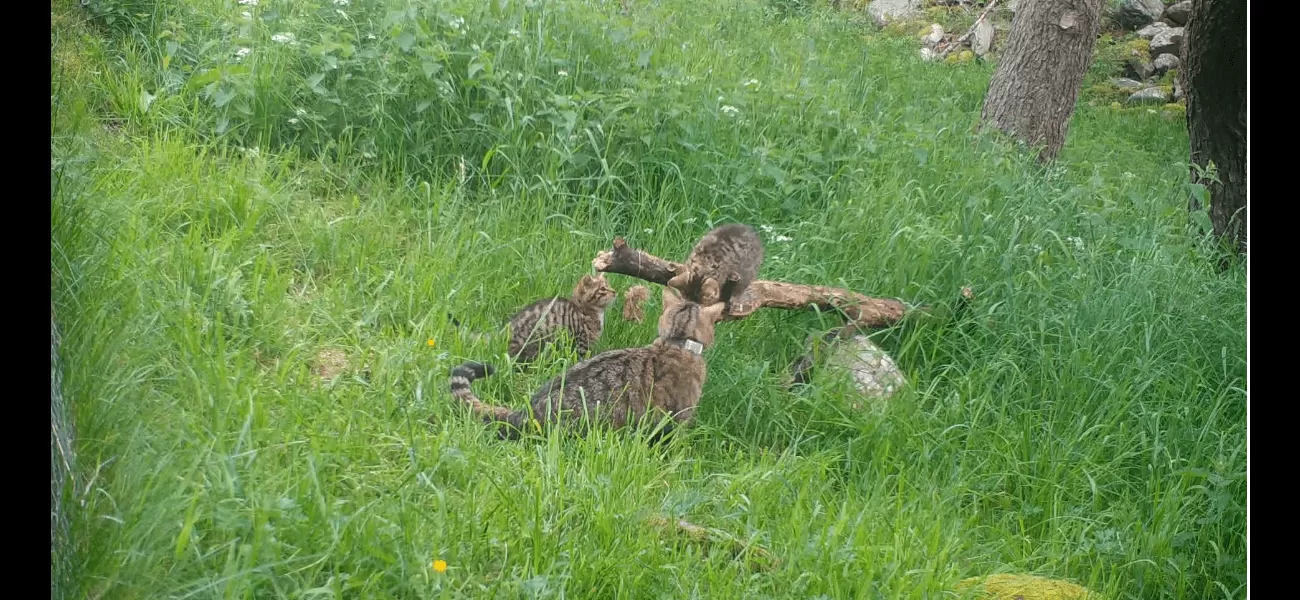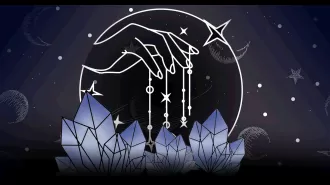Four kittens born outside of captivity in Cairngorms National Park is a significant achievement.
Four wildcat kittens, first born outside captivity in Scotland in 5+ years, mark major milestone in Cairngorms National Park after release of 19 wildcats last summer.
June 24th 2024.

Exciting news from the Cairngorms National Park, as four wildcat kittens have been born in the wild – a rare occurrence in Scotland, where the species has been struggling for survival for years. Last summer, 19 wildcats were released into the park as part of the Saving Wildcats partnership's efforts to restore the population in Scotland. And now, at least two females have given birth in the wild, marking a significant milestone in the project.
Dr Keri Langridge, Saving Wildcats Field Manager, shared the thrilling update, saying, "We suspected that some of the females had given birth when their movements and behaviors suddenly changed, but we couldn't confirm until we captured footage of the kittens on our cameras." It's no easy feat to monitor and film these elusive creatures in the wild, but with the support of local landowners, gamekeepers, and the community, the team has successfully captured the kittens on video.
In the footage, two of the kittens can be seen playing in the grass with their mother and leaping onto a fallen tree branch. These kittens will be monitored until they are old enough for experts to attempt to get a DNA profile from them. The hope is that they are the offspring of male wildcats that were released last year, and the first of many more to come.
Dr Helen Senn, lead for Saving Wildcats, expressed her excitement and optimism for the wildcats' recovery in Scotland, saying, "These births demonstrate that the process of breeding and releasing wildcats is working. These released animals have learned to hunt and survive, and now they are reproducing in their first breeding season – a clear indication that they are doing well." However, she also acknowledged the challenges that these kittens will face in the wild, including high mortality rates and the risk of interbreeding with domestic cats.
Despite efforts to trap, neuter, vaccinate, and release feral domestic cats in the area, there is still a risk of interbreeding. That's why the Saving Wildcats team emphasizes the importance of responsible pet ownership in contributing to wildcat conservation. Dr Senn urges local people to have their pet cats neutered, microchipped, and vaccinated to prevent any potential harm to the wildcat population.
While the team has observed that the two females that gave birth have overlapped with male wildcats, they do not yet know the paternity of the kittens. Once they are old enough, they will attempt to get a DNA profile from them and hope for the best. The team is optimistic that these wildcat kittens are indeed the offspring of the released males, and they are excited for what the future may bring for the species.
This is just one of the many exciting wildlife stories happening in Scotland. You can read more about conservation efforts and other wildlife adventures in the latest issue of Scottish Field. And don't forget to subscribe to stay updated on the latest news and developments in Scottish wildlife.
Dr Keri Langridge, Saving Wildcats Field Manager, shared the thrilling update, saying, "We suspected that some of the females had given birth when their movements and behaviors suddenly changed, but we couldn't confirm until we captured footage of the kittens on our cameras." It's no easy feat to monitor and film these elusive creatures in the wild, but with the support of local landowners, gamekeepers, and the community, the team has successfully captured the kittens on video.
In the footage, two of the kittens can be seen playing in the grass with their mother and leaping onto a fallen tree branch. These kittens will be monitored until they are old enough for experts to attempt to get a DNA profile from them. The hope is that they are the offspring of male wildcats that were released last year, and the first of many more to come.
Dr Helen Senn, lead for Saving Wildcats, expressed her excitement and optimism for the wildcats' recovery in Scotland, saying, "These births demonstrate that the process of breeding and releasing wildcats is working. These released animals have learned to hunt and survive, and now they are reproducing in their first breeding season – a clear indication that they are doing well." However, she also acknowledged the challenges that these kittens will face in the wild, including high mortality rates and the risk of interbreeding with domestic cats.
Despite efforts to trap, neuter, vaccinate, and release feral domestic cats in the area, there is still a risk of interbreeding. That's why the Saving Wildcats team emphasizes the importance of responsible pet ownership in contributing to wildcat conservation. Dr Senn urges local people to have their pet cats neutered, microchipped, and vaccinated to prevent any potential harm to the wildcat population.
While the team has observed that the two females that gave birth have overlapped with male wildcats, they do not yet know the paternity of the kittens. Once they are old enough, they will attempt to get a DNA profile from them and hope for the best. The team is optimistic that these wildcat kittens are indeed the offspring of the released males, and they are excited for what the future may bring for the species.
This is just one of the many exciting wildlife stories happening in Scotland. You can read more about conservation efforts and other wildlife adventures in the latest issue of Scottish Field. And don't forget to subscribe to stay updated on the latest news and developments in Scottish wildlife.
[This article has been trending online recently and has been generated with AI. Your feed is customized.]
[Generative AI is experimental.]
0
0
Submit Comment





